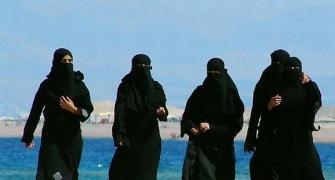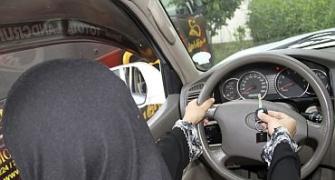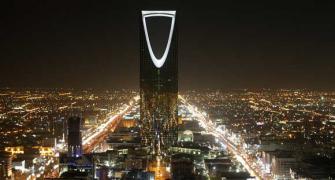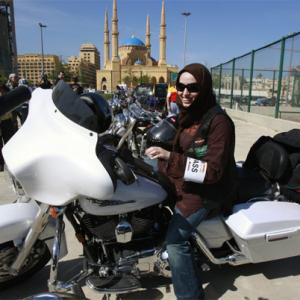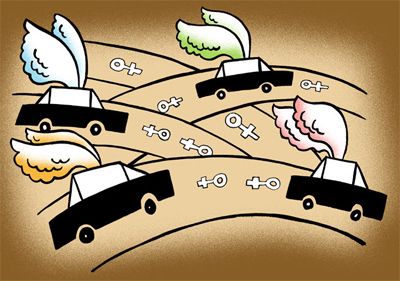 The winds of revolution are blowing all over the Arab world. A bit, slowly in Saudi Arabia, perhaps, but nevertheless.
The winds of revolution are blowing all over the Arab world. A bit, slowly in Saudi Arabia, perhaps, but nevertheless.
Some women did drive, defying the ban and were duly arrested. But the day is not long, may be, just another century at most, when women can actually drive, in women-only lanes, of course, says B S Prakash.
You may have seen media coverage about a serious national crisis that hit Saudi Arabia recently.
In India it was the season of Kali Puja, a time when the fiery strength of the female spirit is remembered. It seemed that the Saudis too, especially the police, were awakening to a manifestation of female energy: some of their citizens, of the wrong gender according to their norms over centuries, were doing the unthinkable.
They wanted to sit behind the steering wheel and heaven forbid, drive a car.
Illustration: Uttam Ghosh/Rediff.com
"Is it really true that women cannot drive a car or go to a shopping mall on their own?" a lady friend asked me, remembering that I had served in Saudi Arabia as a diplomat.
With three cars in the family, she cannot imagine life without she or her the daughters not driving; even more importantly life without the twice weekly visits to the Gurgaon malls.
"Malls there are plenty, but, yes, they cannot drive," I confirmed.
"How do you know? You were there long ago. Things must have changed," she was sceptical.
"Some things do not change in Saudi Arabia," I said with conviction.
I remember my days, decades ago, but yes, some things are indeed immutable such as the status of women in Saudi.
I had landed in Jeddah, the diplomatic capital then, and every day my wife was learning a new factoid about the do's and don'ts of the Kingdom.
How does she go out? Accompanied by your husband, either on foot or by car or driven in an embassy vehicle, or a service car of the expatriate compounds that we lived in.
Of course, there is no question of her driving. That is a foundational taboo, never to be broken. What if a group of ladies walked together, she had asked innocently. It had its own risks, she was told, and an incident that had occurred was narrated.
One day in the life of that timeless country, an elderly lady and her companion, a younger woman who was pregnant, were to be taken to the shopping centre by the husband of the latter. Waiting for the man and a bit restless, they had decided to come down from the apartment block and had stood outside on the street.
Two foreign women, not wearing the full veil, and standing outside in a nice residential area was an unusual sight in itself. Getting impatient after sometime, they started strolling slowly towards the market. They could see a local man trailing behind in a fancy car, but they ignored it.
After a few minutes, the husband drove up and they got into the vehicle. As the car picked up speed and proceeded towards the shopping centre, they could see the other car chase them. The Saudi soon overtook them and stopped their car.
'I saw them first. They are mine,' he remonstrated to the husband.
It took some time for the husband and the ladies to understand what was happening. He had seen them walking on the street; they could be sophisticated 'street walkers'; why else would they walk unescorted, and they had been picked up.
Though outraged, the family kept their cool.
'Do they look like pick-ups? One is my wife and the other is her friend,' explained the husband.
The Saudi was not so easily placated. 'You are lying. OK, Let me take at least one,' he persisted. It took all their persuasion and pleas for him to finally accept the situation and drive off. 'Do not walk on the streets,' was his parting message to the women.
What do you do in a situation like that? Go to the police? But which police?
There are two kinds of police in Saudi Arabia, one the normal kind and the other, the religious police, the so called muttawa.
The latter do the moral policing -- cover your head, close the shop shutters for the prayer time -- kind of policing, enforcing the norms of Wahhabi brand of Sharia. They come under a powerful organisation called 'The Committee for the Prevention of Vice and Promotion of Virtue. I am not making this up. Check for yourself, if you do not believe me.
The alliance between the ruling family founded by King Saud and the staunchly conservative Wahhabi religious establishment is one of the enduring features of that country.
Hence, the women or the husband in my story could not have gone to the muttawa. No sensible person goes to them for help, just as no sensible person will ever go to the Delhi police.
What about the other kind, the normal police? Yes, they do administer justice, but in their own way. I recall here another incident from my experience.
Two Indian workers on a construction site had a big fight. A slender and young worker had somehow miraculously beaten up a much bigger man and a fracas had been created.
The embassy had been called. We reached the site, only to see that the Saudi police had also arrived, a fact that was deeply perturbing all around.
Much against the wishes of the construction company, the embassy officials, and both the Indian workers, they were hauled away to the police station. They returned the next day, looking a bit battered but also bemused.
'What happened?' we wanted to know.
The more aggressive little man had been given ten lashes, for provoking the fight.
'Five lashes for the other one,' the boss of the police station had ordered.
'But what was my fault? I was the one beaten up,' he had pleaded.
'You look healthy and strong. Why did you not beat him in return? Five lashes for you for calling us,' was the answer.
So the results of going to the regular police are unpredictable, again just as in India.
I must confess that as diplomats we lived in a twilight zone, seemingly obeying all the norms, but within the privacy of our embassy or homes, being exempted from the Saudi requirements. One example should suffice.
During my time the move of the embassies to the capital city Riyadh was under progress. An Olympic size swimming pool was being built in the diplomatic enclave.
As you entered the huge compound, there were two separate entrances, clearly marked, one for men and one for the other gender. No surprises there.
Thereafter, you went inside to what was a 'no-go zone' to the Saudi citizens or police, and you saw only one beautiful swimming pool, not subjected to the strict gender separation codes of the State.
Is that not a bit hypocritical, one asked. But the Saudis had long perfected a standard response: 'Hypocrisy is the tribute that vice pays to virtue.'
As I remember and write all this, the winds of revolution are blowing all over the Arab world. A bit, slowly in Saudi Arabia, perhaps, but nevertheless.
Some women did drive, defying the ban and were duly arrested. But the day is not long, may be, just another century at most, when women can actually drive, in women-only lanes, of course.
Ambassador B S Prakash retired from the Indian Foreign Service recently.
You can read Ambassador Prakash's earlier columns here.

